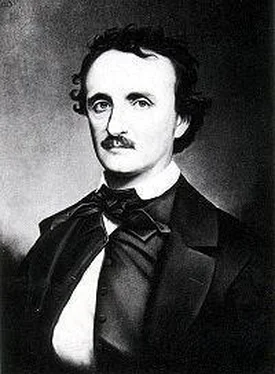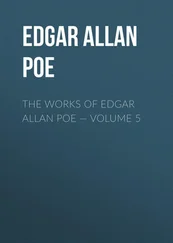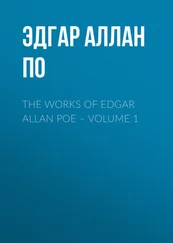Эдгар По - Works of Edgar Allan Poe
Здесь есть возможность читать онлайн «Эдгар По - Works of Edgar Allan Poe» весь текст электронной книги совершенно бесплатно (целиком полную версию без сокращений). В некоторых случаях можно слушать аудио, скачать через торрент в формате fb2 и присутствует краткое содержание. Жанр: Старинная литература, на английском языке. Описание произведения, (предисловие) а так же отзывы посетителей доступны на портале библиотеки ЛибКат.
- Название:Works of Edgar Allan Poe
- Автор:
- Жанр:
- Год:неизвестен
- ISBN:нет данных
- Рейтинг книги:4 / 5. Голосов: 1
-
Избранное:Добавить в избранное
- Отзывы:
-
Ваша оценка:
- 80
- 1
- 2
- 3
- 4
- 5
Works of Edgar Allan Poe: краткое содержание, описание и аннотация
Предлагаем к чтению аннотацию, описание, краткое содержание или предисловие (зависит от того, что написал сам автор книги «Works of Edgar Allan Poe»). Если вы не нашли необходимую информацию о книге — напишите в комментариях, мы постараемся отыскать её.
Works of Edgar Allan Poe — читать онлайн бесплатно полную книгу (весь текст) целиком
Ниже представлен текст книги, разбитый по страницам. Система сохранения места последней прочитанной страницы, позволяет с удобством читать онлайн бесплатно книгу «Works of Edgar Allan Poe», без необходимости каждый раз заново искать на чём Вы остановились. Поставьте закладку, и сможете в любой момент перейти на страницу, на которой закончили чтение.
Интервал:
Закладка:
A succession of loud and shrill screams, bursting suddenly from the throat of the chained form, seemed to thrust me violently back. For a brief moment I hesitated - I trembled. Unsheathing my rapier, I began to grope with it about the recess: but the thought of an instant reassured me. I placed my hand upon the solid fabric of the catacombs, and felt satisfied. I reapproached the wall. I replied to the yells of him who clamored. I re-echoed - I aided - I surpassed them in volume and in strength. I did this, and the clamorer grew still.
It was now midnight, and my task was drawing to a close. I had completed the eighth, the ninth, and the tenth tier. I had finished a portion of the last and the eleventh; there remained but a single stone to be fitted and plastered in. I struggled with its weight; I placed it partially in its destined position. But now there came from out the niche a low laugh that erected the hairs upon my head. It was succeeded by a sad voice, which I had difficulty in recognising as that of the noble Fortunato. The voice said -
"Ha! ha! ha! - he! he! - a very good joke indeed - an excellent jest. We will have many a rich laugh about it at the palazzo - he! he! he! - over our wine - he! he! he!"
"The Amontillado!" I said.
"He! he! he! - he! he! he! - yes, the Amontillado. But is it not getting late? Will not they be awaiting us at the palazzo, the Lady Fortunato and the rest? Let us be gone."
"Yes," I said, "let us be gone."
"For the love of God, Montressor!"
"Yes," I said, "for the love of God!"
But to these words I hearkened in vain for a reply. I grew impatient. I called aloud -
"Fortunato!"
No answer. I called again -
"Fortunato!"
No answer still. I thrust a torch through the remaining aperture and let it fall within. There came forth in return only a jingling of the bells. My heart grew sick - on account of the dampness of the catacombs. I hastened to make an end of my labor. I forced the last stone into its position; I plastered it up. Against the new masonry I re-erected the old rampart of bones. For the half of a century no mortal has disturbed them. In pace requiescat!
________
The End | Go to top
The Colloquy of Monos and Una
"Μελλοντα ταυτα
These; things are in the future."
Sophocles - Antig:
Una. "Born again?"
Monos. Yes, fairest and best beloved Una, "born again." These were the words upon whose mystical meaning I had so long pondered, rejecting the explanations of the priesthood, until Death himself resolved for me the secret.
Una. Death!
Monos. How strangely, sweet Una, you echo my words! I observe, too, a vacillation in your step - a joyous inquietude in your eyes. You are confused and oppressed by the majestic novelty of the Life Eternal. Yes, it was of Death I spoke. And here how singularly sounds that word which of old was wont to bring terror to all hearts - throwing a mildew upon all pleasures!
Una. Ah, Death, the spectre which sate at all feasts! How often, Monos, did we lose ourselves in speculations upon its nature! How mysteriously did it act as a check to human bliss - saying unto it "thus far, and no farther!" That earnest mutual love, my own Monos, which burned within our bosoms how vainly did we flatter ourselves, feeling happy in its first up-springing, that our happiness would strengthen with its strength! Alas! as it grew, so grew in our hearts the dread of that evil hour which was hurrying to separate us forever! Thus, in time, it became painful to love. Hate would have been mercy then.
Monos. Speak not here of these griefs, dear Una - mine, mine, forever now!
Una. But the memory of past sorrow - is it not present joy? I have much to say yet of the things which have been. Above all, I burn to know the incidents of your own passage through the dark Valley and Shadow.
Monos. And when did the radiant Una ask anything of her Monos in vain? I will be minute in relating all - but at what point shall the weird narrative begin?
Una. At what point?
Monos. You have said.
Una. Monos, I comprehend you. In Death we have both learned the propensity of man to define the indefinable. I will not say, then, commence with the moment of life's cessation - but commence with that sad, sad instant when, the fever having abandoned you, you sank into a breathless and motionless torpor, and I pressed down your pallid eyelids with the passionate fingers of love.
Monos. One word first, my Una, in regard to man's general condition at this epoch. You will remember that one or two of the wise among our forefathers - wise in fact, although not in the world's esteem - had ventured to doubt the propriety of the term "improvement," as applied to the progress of our civilization. There were periods in each of the five or six centuries immediately preceding our dissolution, when arose some vigorous intellect, boldly contending for those principles whose truth appears now, to our disenfranchised reason, so utterly obvious - principles which should have taught our race to submit to the guidance of the natural laws, rather than attempt their control. At long intervals some masterminds appeared, looking upon each advance in practical science as a retro-gradation in the true utility. Occasionally the poetic intellect - that intellect which we now feel to have been the most exalted of all - since those truths which to us were of the most enduring importance could only be reached by that analogywhich speaks in proof tones to the imagination alone and to the unaided reason bears no weight - occasionally did this poetic intellect proceed a step farther in the evolving of the vague idea of the philosophic, and find in the mystic parable that tells of the tree of knowledge, and of its forbidden fruit, death-producing, a distinct intimation that knowledge was not meet for man in the infant condition of his soul. And these men - the poets - living and perishing amid the scorn of the "utilitarians" - of rough pedants, who arrogated to themselves a title which could have been properly applied only to the scorned - these men, the poets, pondered piningly, yet not unwisely, upon the ancient days when our wants were not more simple than our enjoyments were keen - days when mirth was a word unknown, so solemnly deep-toned was happiness - holy, august and blissful days, when blue rivers ran undammed, between hills unhewn, into far forest solitudes, primæval, odorous, and unexplored.
Yet these noble exceptions from the general misrule served but to strengthen it by opposition. Alas! we had fallen upon the most evil of all our evil days. The great "movement" - that was the cant term - went on: a diseased commotion, moral and physical. Art - the Arts - arose supreme, and, once enthroned, cast chains upon the intellect which had elevated them to power. Man, because he could not but acknowledge the majesty of Nature, fell into childish exultation at his acquired and still-increasing dominion over her elements. Even while he stalked a God in his own fancy, an infantine imbecility came over him. As might be supposed from the origin of his disorder, he grew infected with system, and with abstraction. He enwrapped himself in generalities. Among other odd ideas, that of universal equality gained ground; and in the face of analogy and of God - in despite of the loud warning voice of the laws of gradation so visibly pervading all things in Earth an Heaven - wild attempts at an omni-prevalent Democracy were made. Yet this evil sprang necessarily from the leading evil, Knowledge. Man could not both know and succumb. Meantime huge smoking cities arose, innumerable. Green leaves shrank before the hot breath of furnaces. The fair face of Nature was deformed as with the ravages of some loathsome disease. And methinks, sweet Una, even our slumbering sense of the forced and of the far-fetched might have arrested us here. But now it appears that we had worked out our own destruction in the perversion of our taste, or rather in the blind neglect of its culture in the schools. For, in truth, it was at this crisis that taste alone - that faculty which, holding a middle position between the pure intellect and the moral sense, could never safely have been disregarded - it was now that taste alone could have led us gently back to Beauty, to Nature, and to Life. But alas for the pure contemplative spirit and majestic intuition of Plato! Alas for the which he justly regarded as an all-sufficient education for the soul! Alas for him and for it! - since both were most desperately needed when both were most entirely forgotten or despised. {*1}
Читать дальшеИнтервал:
Закладка:
Похожие книги на «Works of Edgar Allan Poe»
Представляем Вашему вниманию похожие книги на «Works of Edgar Allan Poe» списком для выбора. Мы отобрали схожую по названию и смыслу литературу в надежде предоставить читателям больше вариантов отыскать новые, интересные, ещё непрочитанные произведения.
Обсуждение, отзывы о книге «Works of Edgar Allan Poe» и просто собственные мнения читателей. Оставьте ваши комментарии, напишите, что Вы думаете о произведении, его смысле или главных героях. Укажите что конкретно понравилось, а что нет, и почему Вы так считаете.












